Higher Education: Skills Development, Critical Thinking, and Learning
VerifiedAdded on 2021/02/22
|11
|1897
|99
Essay
AI Summary
This essay examines the transition from school to higher education, highlighting the essential skills and competencies needed for academic success. The author reflects on the differences between school and university learning patterns, emphasizing the importance of self-management, critical thinking, and independent learning. The essay explores how critical thinking is integrated into the learning process, particularly in evaluating learning materials and making informed decisions. It also discusses the development of key skills such as academic discourse, networking, time management, and problem-solving. The author concludes that actively developing these skills is crucial for thriving in higher education, and suggests strategies such as participating in discussions, analyzing academic texts, and building strong networks to enhance communication and understanding. The essay emphasizes the importance of self-motivation and a proactive approach to learning for achieving higher education goals.
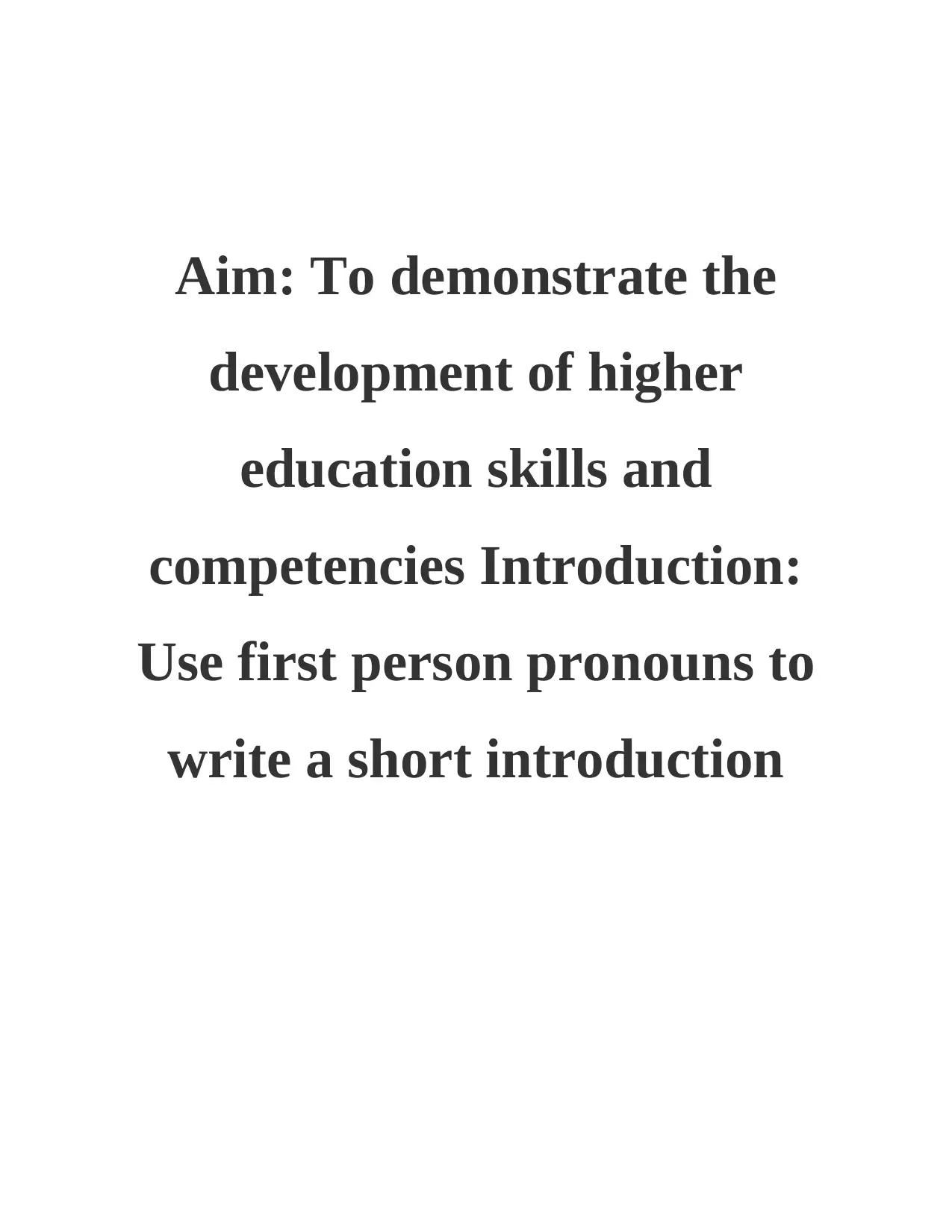
Aim: To demonstrate the
development of higher
education skills and
competencies Introduction:
Use first person pronouns to
write a short introduction
development of higher
education skills and
competencies Introduction:
Use first person pronouns to
write a short introduction
Paraphrase This Document
Need a fresh take? Get an instant paraphrase of this document with our AI Paraphraser
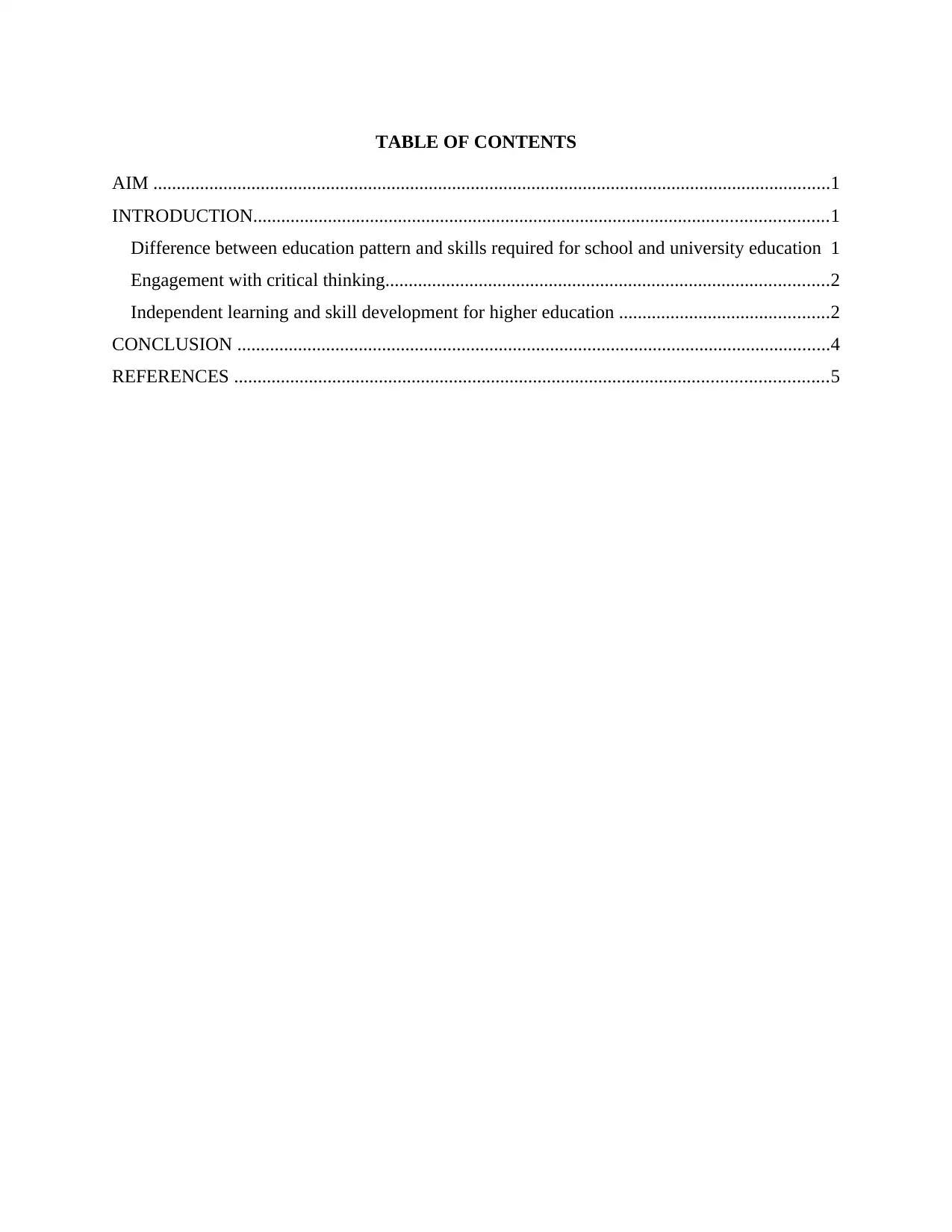
TABLE OF CONTENTS
AIM .................................................................................................................................................1
INTRODUCTION...........................................................................................................................1
Difference between education pattern and skills required for school and university education 1
Engagement with critical thinking...............................................................................................2
Independent learning and skill development for higher education .............................................2
CONCLUSION ...............................................................................................................................4
REFERENCES ...............................................................................................................................5
AIM .................................................................................................................................................1
INTRODUCTION...........................................................................................................................1
Difference between education pattern and skills required for school and university education 1
Engagement with critical thinking...............................................................................................2
Independent learning and skill development for higher education .............................................2
CONCLUSION ...............................................................................................................................4
REFERENCES ...............................................................................................................................5
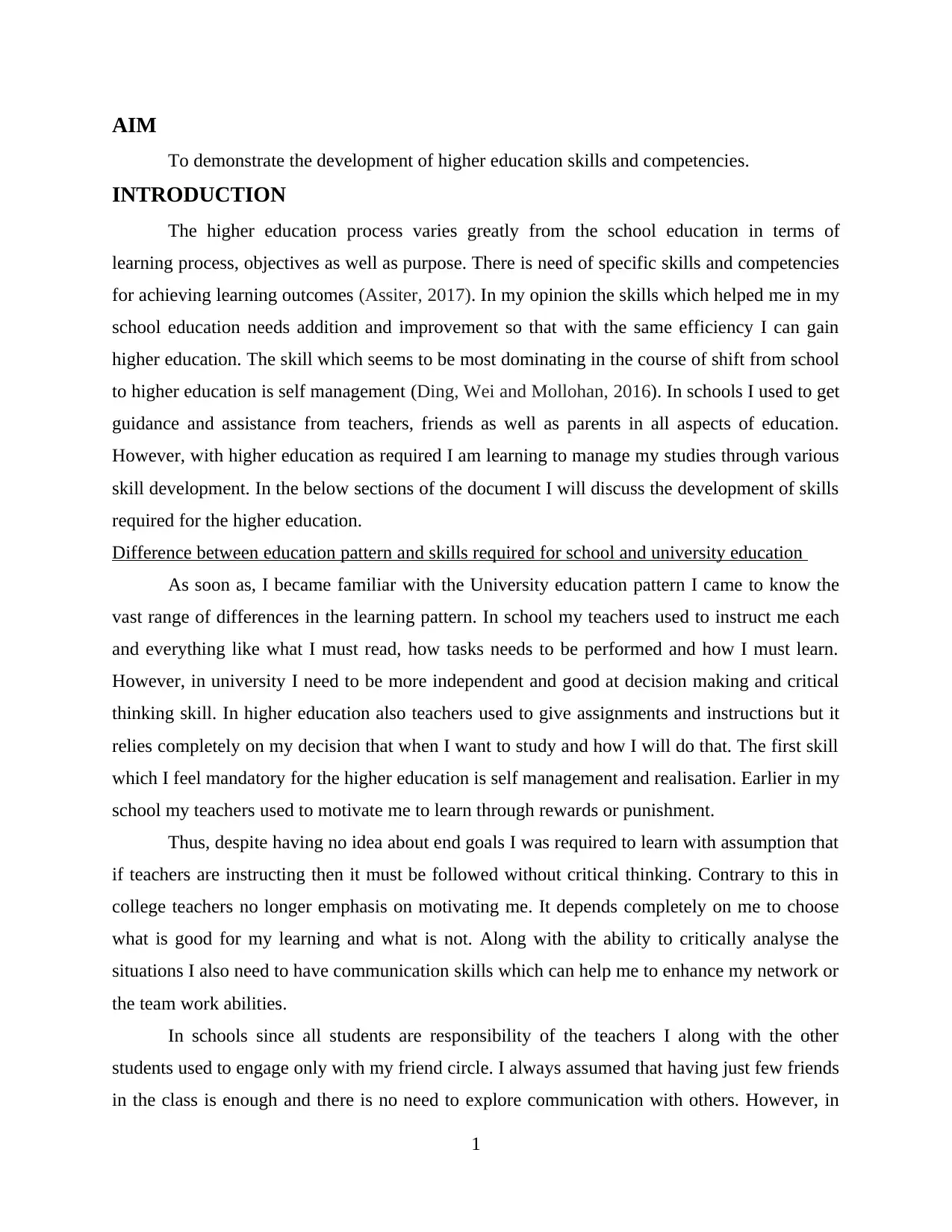
AIM
To demonstrate the development of higher education skills and competencies.
INTRODUCTION
The higher education process varies greatly from the school education in terms of
learning process, objectives as well as purpose. There is need of specific skills and competencies
for achieving learning outcomes (Assiter, 2017). In my opinion the skills which helped me in my
school education needs addition and improvement so that with the same efficiency I can gain
higher education. The skill which seems to be most dominating in the course of shift from school
to higher education is self management (Ding, Wei and Mollohan, 2016). In schools I used to get
guidance and assistance from teachers, friends as well as parents in all aspects of education.
However, with higher education as required I am learning to manage my studies through various
skill development. In the below sections of the document I will discuss the development of skills
required for the higher education.
Difference between education pattern and skills required for school and university education
As soon as, I became familiar with the University education pattern I came to know the
vast range of differences in the learning pattern. In school my teachers used to instruct me each
and everything like what I must read, how tasks needs to be performed and how I must learn.
However, in university I need to be more independent and good at decision making and critical
thinking skill. In higher education also teachers used to give assignments and instructions but it
relies completely on my decision that when I want to study and how I will do that. The first skill
which I feel mandatory for the higher education is self management and realisation. Earlier in my
school my teachers used to motivate me to learn through rewards or punishment.
Thus, despite having no idea about end goals I was required to learn with assumption that
if teachers are instructing then it must be followed without critical thinking. Contrary to this in
college teachers no longer emphasis on motivating me. It depends completely on me to choose
what is good for my learning and what is not. Along with the ability to critically analyse the
situations I also need to have communication skills which can help me to enhance my network or
the team work abilities.
In schools since all students are responsibility of the teachers I along with the other
students used to engage only with my friend circle. I always assumed that having just few friends
in the class is enough and there is no need to explore communication with others. However, in
1
To demonstrate the development of higher education skills and competencies.
INTRODUCTION
The higher education process varies greatly from the school education in terms of
learning process, objectives as well as purpose. There is need of specific skills and competencies
for achieving learning outcomes (Assiter, 2017). In my opinion the skills which helped me in my
school education needs addition and improvement so that with the same efficiency I can gain
higher education. The skill which seems to be most dominating in the course of shift from school
to higher education is self management (Ding, Wei and Mollohan, 2016). In schools I used to get
guidance and assistance from teachers, friends as well as parents in all aspects of education.
However, with higher education as required I am learning to manage my studies through various
skill development. In the below sections of the document I will discuss the development of skills
required for the higher education.
Difference between education pattern and skills required for school and university education
As soon as, I became familiar with the University education pattern I came to know the
vast range of differences in the learning pattern. In school my teachers used to instruct me each
and everything like what I must read, how tasks needs to be performed and how I must learn.
However, in university I need to be more independent and good at decision making and critical
thinking skill. In higher education also teachers used to give assignments and instructions but it
relies completely on my decision that when I want to study and how I will do that. The first skill
which I feel mandatory for the higher education is self management and realisation. Earlier in my
school my teachers used to motivate me to learn through rewards or punishment.
Thus, despite having no idea about end goals I was required to learn with assumption that
if teachers are instructing then it must be followed without critical thinking. Contrary to this in
college teachers no longer emphasis on motivating me. It depends completely on me to choose
what is good for my learning and what is not. Along with the ability to critically analyse the
situations I also need to have communication skills which can help me to enhance my network or
the team work abilities.
In schools since all students are responsibility of the teachers I along with the other
students used to engage only with my friend circle. I always assumed that having just few friends
in the class is enough and there is no need to explore communication with others. However, in
1
⊘ This is a preview!⊘
Do you want full access?
Subscribe today to unlock all pages.

Trusted by 1+ million students worldwide
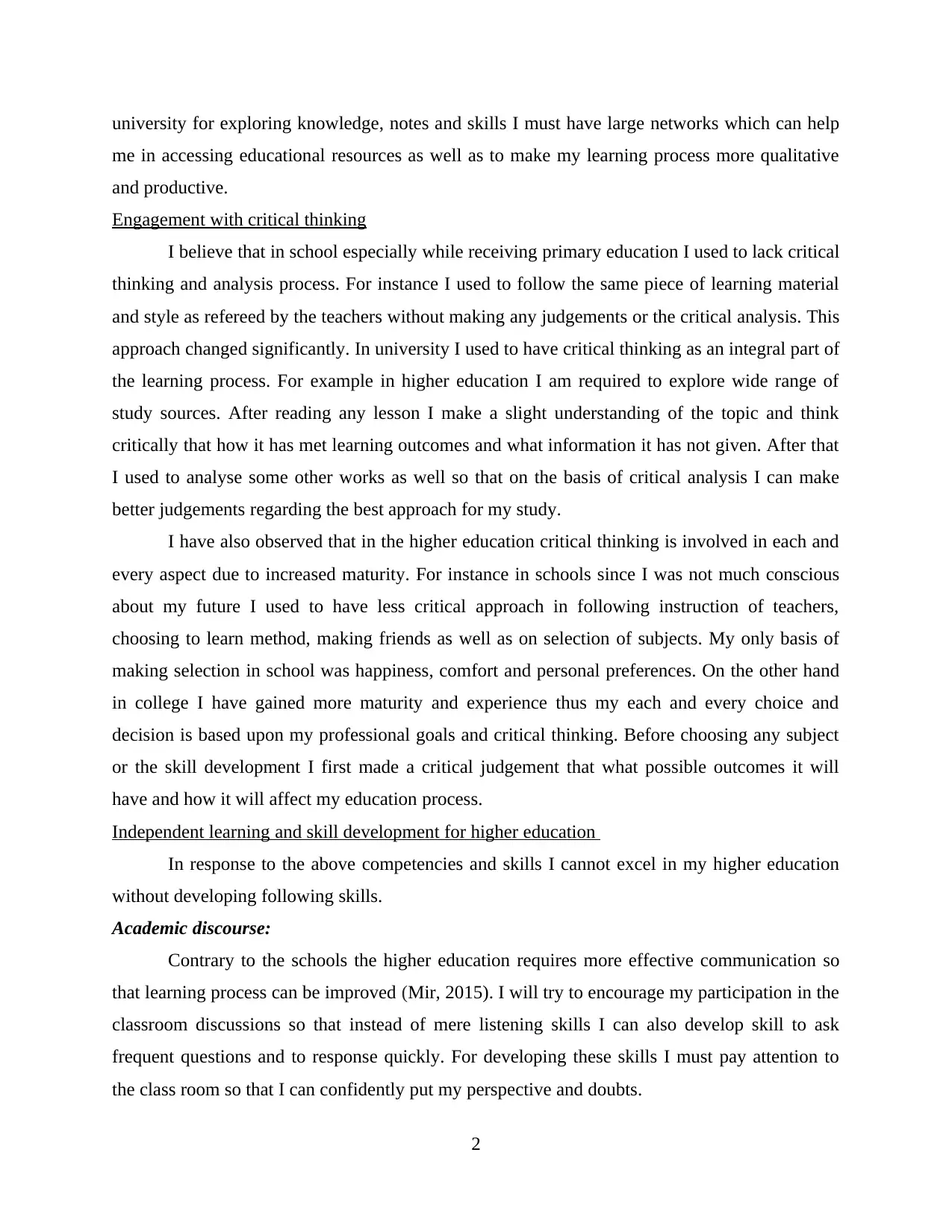
university for exploring knowledge, notes and skills I must have large networks which can help
me in accessing educational resources as well as to make my learning process more qualitative
and productive.
Engagement with critical thinking
I believe that in school especially while receiving primary education I used to lack critical
thinking and analysis process. For instance I used to follow the same piece of learning material
and style as refereed by the teachers without making any judgements or the critical analysis. This
approach changed significantly. In university I used to have critical thinking as an integral part of
the learning process. For example in higher education I am required to explore wide range of
study sources. After reading any lesson I make a slight understanding of the topic and think
critically that how it has met learning outcomes and what information it has not given. After that
I used to analyse some other works as well so that on the basis of critical analysis I can make
better judgements regarding the best approach for my study.
I have also observed that in the higher education critical thinking is involved in each and
every aspect due to increased maturity. For instance in schools since I was not much conscious
about my future I used to have less critical approach in following instruction of teachers,
choosing to learn method, making friends as well as on selection of subjects. My only basis of
making selection in school was happiness, comfort and personal preferences. On the other hand
in college I have gained more maturity and experience thus my each and every choice and
decision is based upon my professional goals and critical thinking. Before choosing any subject
or the skill development I first made a critical judgement that what possible outcomes it will
have and how it will affect my education process.
Independent learning and skill development for higher education
In response to the above competencies and skills I cannot excel in my higher education
without developing following skills.
Academic discourse:
Contrary to the schools the higher education requires more effective communication so
that learning process can be improved (Mir, 2015). I will try to encourage my participation in the
classroom discussions so that instead of mere listening skills I can also develop skill to ask
frequent questions and to response quickly. For developing these skills I must pay attention to
the class room so that I can confidently put my perspective and doubts.
2
me in accessing educational resources as well as to make my learning process more qualitative
and productive.
Engagement with critical thinking
I believe that in school especially while receiving primary education I used to lack critical
thinking and analysis process. For instance I used to follow the same piece of learning material
and style as refereed by the teachers without making any judgements or the critical analysis. This
approach changed significantly. In university I used to have critical thinking as an integral part of
the learning process. For example in higher education I am required to explore wide range of
study sources. After reading any lesson I make a slight understanding of the topic and think
critically that how it has met learning outcomes and what information it has not given. After that
I used to analyse some other works as well so that on the basis of critical analysis I can make
better judgements regarding the best approach for my study.
I have also observed that in the higher education critical thinking is involved in each and
every aspect due to increased maturity. For instance in schools since I was not much conscious
about my future I used to have less critical approach in following instruction of teachers,
choosing to learn method, making friends as well as on selection of subjects. My only basis of
making selection in school was happiness, comfort and personal preferences. On the other hand
in college I have gained more maturity and experience thus my each and every choice and
decision is based upon my professional goals and critical thinking. Before choosing any subject
or the skill development I first made a critical judgement that what possible outcomes it will
have and how it will affect my education process.
Independent learning and skill development for higher education
In response to the above competencies and skills I cannot excel in my higher education
without developing following skills.
Academic discourse:
Contrary to the schools the higher education requires more effective communication so
that learning process can be improved (Mir, 2015). I will try to encourage my participation in the
classroom discussions so that instead of mere listening skills I can also develop skill to ask
frequent questions and to response quickly. For developing these skills I must pay attention to
the class room so that I can confidently put my perspective and doubts.
2
Paraphrase This Document
Need a fresh take? Get an instant paraphrase of this document with our AI Paraphraser
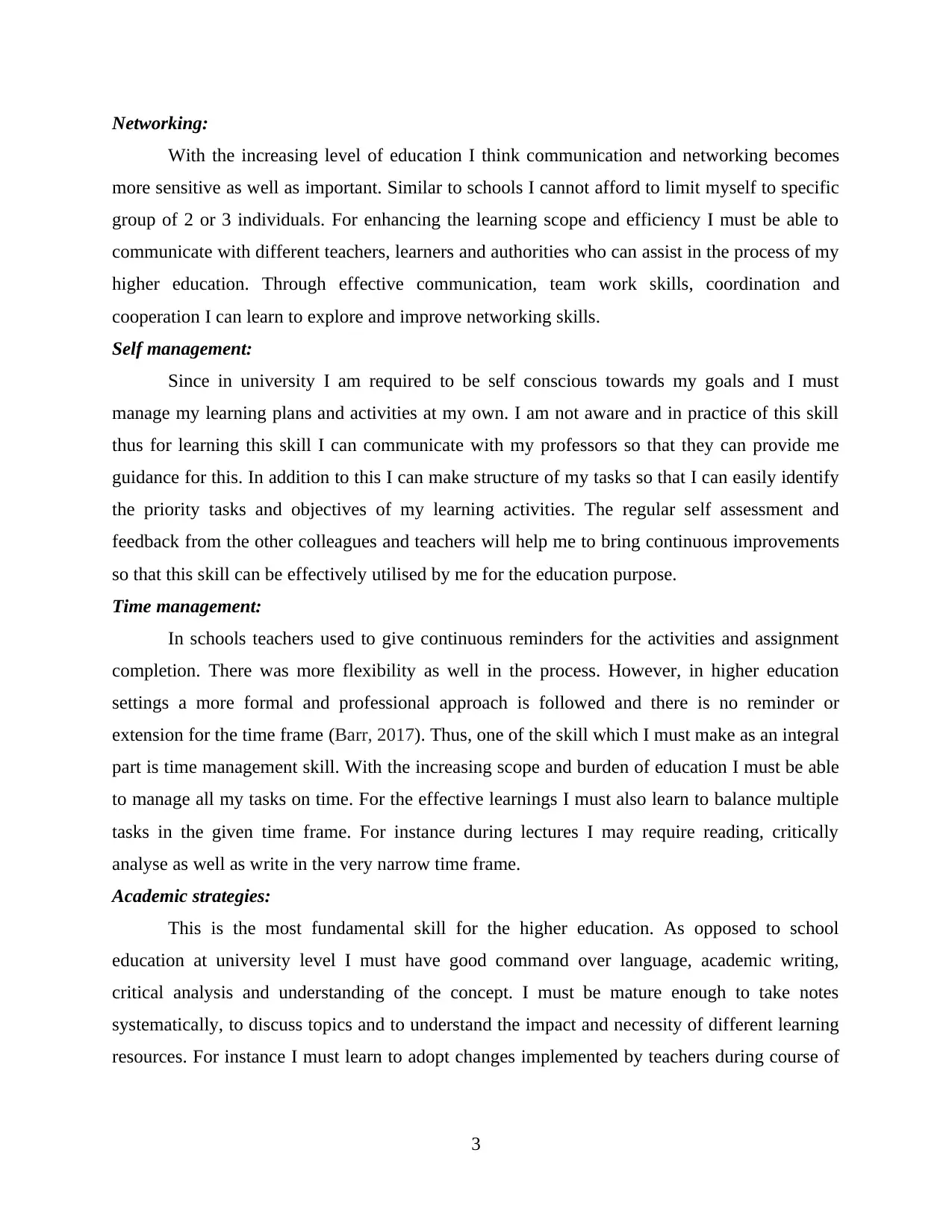
Networking:
With the increasing level of education I think communication and networking becomes
more sensitive as well as important. Similar to schools I cannot afford to limit myself to specific
group of 2 or 3 individuals. For enhancing the learning scope and efficiency I must be able to
communicate with different teachers, learners and authorities who can assist in the process of my
higher education. Through effective communication, team work skills, coordination and
cooperation I can learn to explore and improve networking skills.
Self management:
Since in university I am required to be self conscious towards my goals and I must
manage my learning plans and activities at my own. I am not aware and in practice of this skill
thus for learning this skill I can communicate with my professors so that they can provide me
guidance for this. In addition to this I can make structure of my tasks so that I can easily identify
the priority tasks and objectives of my learning activities. The regular self assessment and
feedback from the other colleagues and teachers will help me to bring continuous improvements
so that this skill can be effectively utilised by me for the education purpose.
Time management:
In schools teachers used to give continuous reminders for the activities and assignment
completion. There was more flexibility as well in the process. However, in higher education
settings a more formal and professional approach is followed and there is no reminder or
extension for the time frame (Barr, 2017). Thus, one of the skill which I must make as an integral
part is time management skill. With the increasing scope and burden of education I must be able
to manage all my tasks on time. For the effective learnings I must also learn to balance multiple
tasks in the given time frame. For instance during lectures I may require reading, critically
analyse as well as write in the very narrow time frame.
Academic strategies:
This is the most fundamental skill for the higher education. As opposed to school
education at university level I must have good command over language, academic writing,
critical analysis and understanding of the concept. I must be mature enough to take notes
systematically, to discuss topics and to understand the impact and necessity of different learning
resources. For instance I must learn to adopt changes implemented by teachers during course of
3
With the increasing level of education I think communication and networking becomes
more sensitive as well as important. Similar to schools I cannot afford to limit myself to specific
group of 2 or 3 individuals. For enhancing the learning scope and efficiency I must be able to
communicate with different teachers, learners and authorities who can assist in the process of my
higher education. Through effective communication, team work skills, coordination and
cooperation I can learn to explore and improve networking skills.
Self management:
Since in university I am required to be self conscious towards my goals and I must
manage my learning plans and activities at my own. I am not aware and in practice of this skill
thus for learning this skill I can communicate with my professors so that they can provide me
guidance for this. In addition to this I can make structure of my tasks so that I can easily identify
the priority tasks and objectives of my learning activities. The regular self assessment and
feedback from the other colleagues and teachers will help me to bring continuous improvements
so that this skill can be effectively utilised by me for the education purpose.
Time management:
In schools teachers used to give continuous reminders for the activities and assignment
completion. There was more flexibility as well in the process. However, in higher education
settings a more formal and professional approach is followed and there is no reminder or
extension for the time frame (Barr, 2017). Thus, one of the skill which I must make as an integral
part is time management skill. With the increasing scope and burden of education I must be able
to manage all my tasks on time. For the effective learnings I must also learn to balance multiple
tasks in the given time frame. For instance during lectures I may require reading, critically
analyse as well as write in the very narrow time frame.
Academic strategies:
This is the most fundamental skill for the higher education. As opposed to school
education at university level I must have good command over language, academic writing,
critical analysis and understanding of the concept. I must be mature enough to take notes
systematically, to discuss topics and to understand the impact and necessity of different learning
resources. For instance I must learn to adopt changes implemented by teachers during course of
3
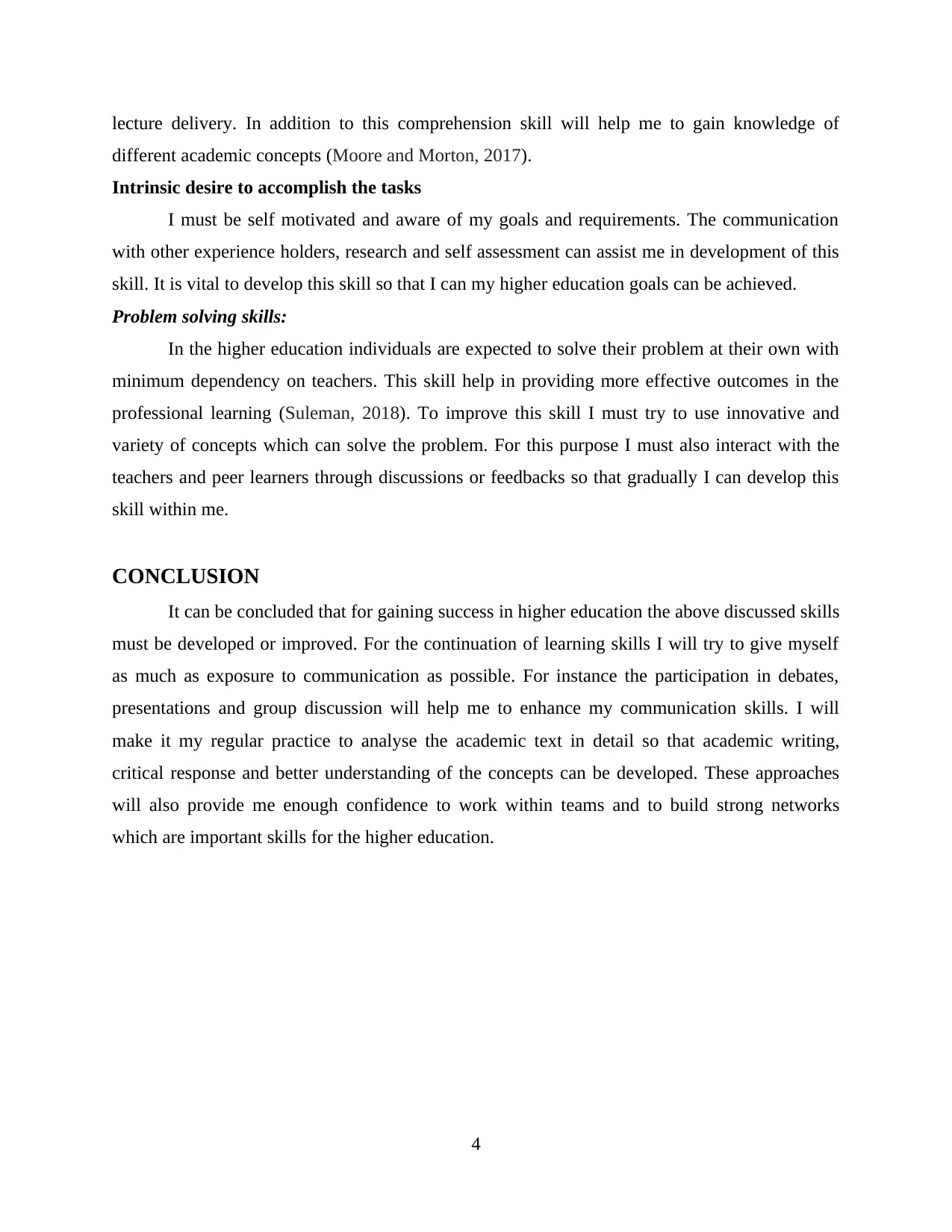
lecture delivery. In addition to this comprehension skill will help me to gain knowledge of
different academic concepts (Moore and Morton, 2017).
Intrinsic desire to accomplish the tasks
I must be self motivated and aware of my goals and requirements. The communication
with other experience holders, research and self assessment can assist me in development of this
skill. It is vital to develop this skill so that I can my higher education goals can be achieved.
Problem solving skills:
In the higher education individuals are expected to solve their problem at their own with
minimum dependency on teachers. This skill help in providing more effective outcomes in the
professional learning (Suleman, 2018). To improve this skill I must try to use innovative and
variety of concepts which can solve the problem. For this purpose I must also interact with the
teachers and peer learners through discussions or feedbacks so that gradually I can develop this
skill within me.
CONCLUSION
It can be concluded that for gaining success in higher education the above discussed skills
must be developed or improved. For the continuation of learning skills I will try to give myself
as much as exposure to communication as possible. For instance the participation in debates,
presentations and group discussion will help me to enhance my communication skills. I will
make it my regular practice to analyse the academic text in detail so that academic writing,
critical response and better understanding of the concepts can be developed. These approaches
will also provide me enough confidence to work within teams and to build strong networks
which are important skills for the higher education.
4
different academic concepts (Moore and Morton, 2017).
Intrinsic desire to accomplish the tasks
I must be self motivated and aware of my goals and requirements. The communication
with other experience holders, research and self assessment can assist me in development of this
skill. It is vital to develop this skill so that I can my higher education goals can be achieved.
Problem solving skills:
In the higher education individuals are expected to solve their problem at their own with
minimum dependency on teachers. This skill help in providing more effective outcomes in the
professional learning (Suleman, 2018). To improve this skill I must try to use innovative and
variety of concepts which can solve the problem. For this purpose I must also interact with the
teachers and peer learners through discussions or feedbacks so that gradually I can develop this
skill within me.
CONCLUSION
It can be concluded that for gaining success in higher education the above discussed skills
must be developed or improved. For the continuation of learning skills I will try to give myself
as much as exposure to communication as possible. For instance the participation in debates,
presentations and group discussion will help me to enhance my communication skills. I will
make it my regular practice to analyse the academic text in detail so that academic writing,
critical response and better understanding of the concepts can be developed. These approaches
will also provide me enough confidence to work within teams and to build strong networks
which are important skills for the higher education.
4
⊘ This is a preview!⊘
Do you want full access?
Subscribe today to unlock all pages.

Trusted by 1+ million students worldwide
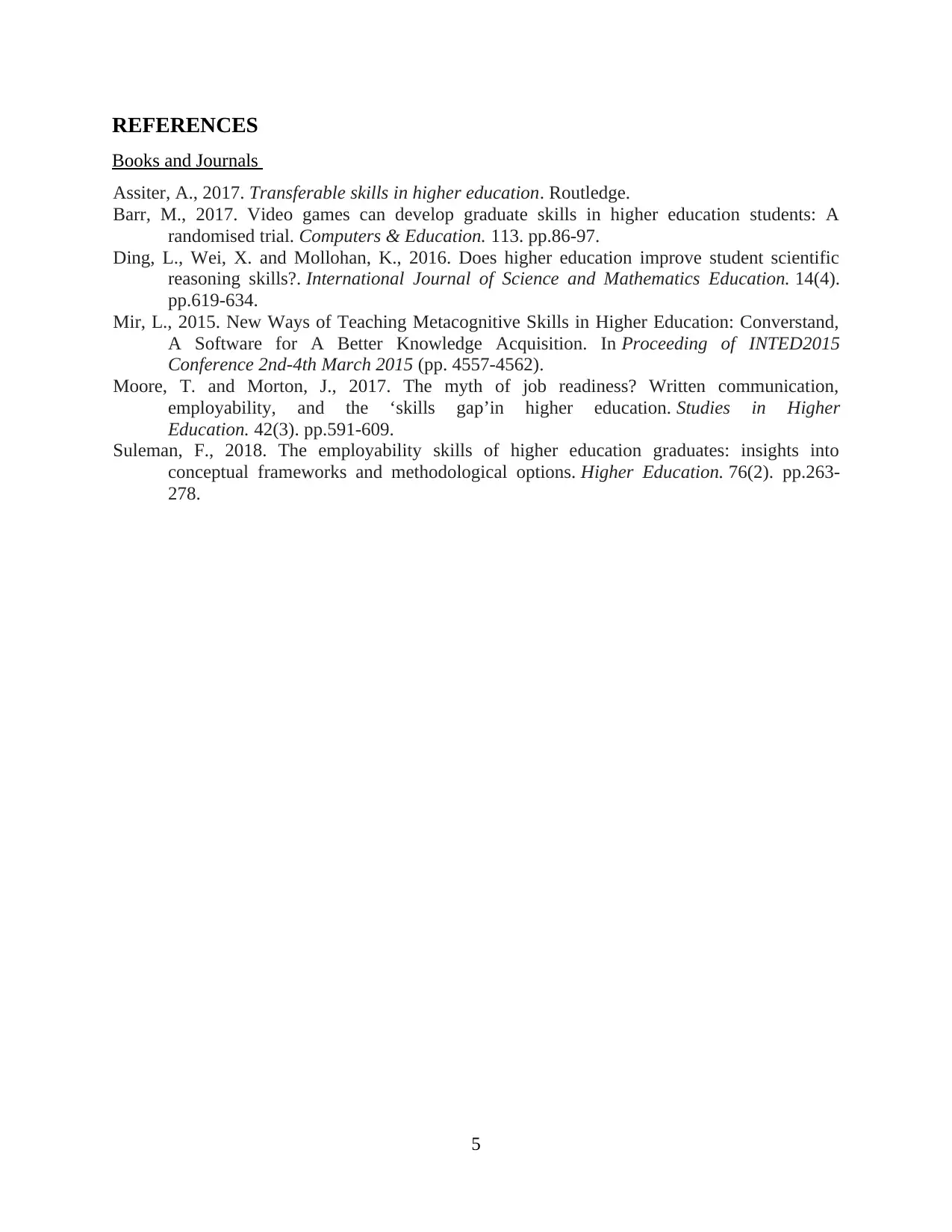
REFERENCES
Books and Journals
Assiter, A., 2017. Transferable skills in higher education. Routledge.
Barr, M., 2017. Video games can develop graduate skills in higher education students: A
randomised trial. Computers & Education. 113. pp.86-97.
Ding, L., Wei, X. and Mollohan, K., 2016. Does higher education improve student scientific
reasoning skills?. International Journal of Science and Mathematics Education. 14(4).
pp.619-634.
Mir, L., 2015. New Ways of Teaching Metacognitive Skills in Higher Education: Converstand,
A Software for A Better Knowledge Acquisition. In Proceeding of INTED2015
Conference 2nd-4th March 2015 (pp. 4557-4562).
Moore, T. and Morton, J., 2017. The myth of job readiness? Written communication,
employability, and the ‘skills gap’in higher education. Studies in Higher
Education. 42(3). pp.591-609.
Suleman, F., 2018. The employability skills of higher education graduates: insights into
conceptual frameworks and methodological options. Higher Education. 76(2). pp.263-
278.
5
Books and Journals
Assiter, A., 2017. Transferable skills in higher education. Routledge.
Barr, M., 2017. Video games can develop graduate skills in higher education students: A
randomised trial. Computers & Education. 113. pp.86-97.
Ding, L., Wei, X. and Mollohan, K., 2016. Does higher education improve student scientific
reasoning skills?. International Journal of Science and Mathematics Education. 14(4).
pp.619-634.
Mir, L., 2015. New Ways of Teaching Metacognitive Skills in Higher Education: Converstand,
A Software for A Better Knowledge Acquisition. In Proceeding of INTED2015
Conference 2nd-4th March 2015 (pp. 4557-4562).
Moore, T. and Morton, J., 2017. The myth of job readiness? Written communication,
employability, and the ‘skills gap’in higher education. Studies in Higher
Education. 42(3). pp.591-609.
Suleman, F., 2018. The employability skills of higher education graduates: insights into
conceptual frameworks and methodological options. Higher Education. 76(2). pp.263-
278.
5
Paraphrase This Document
Need a fresh take? Get an instant paraphrase of this document with our AI Paraphraser
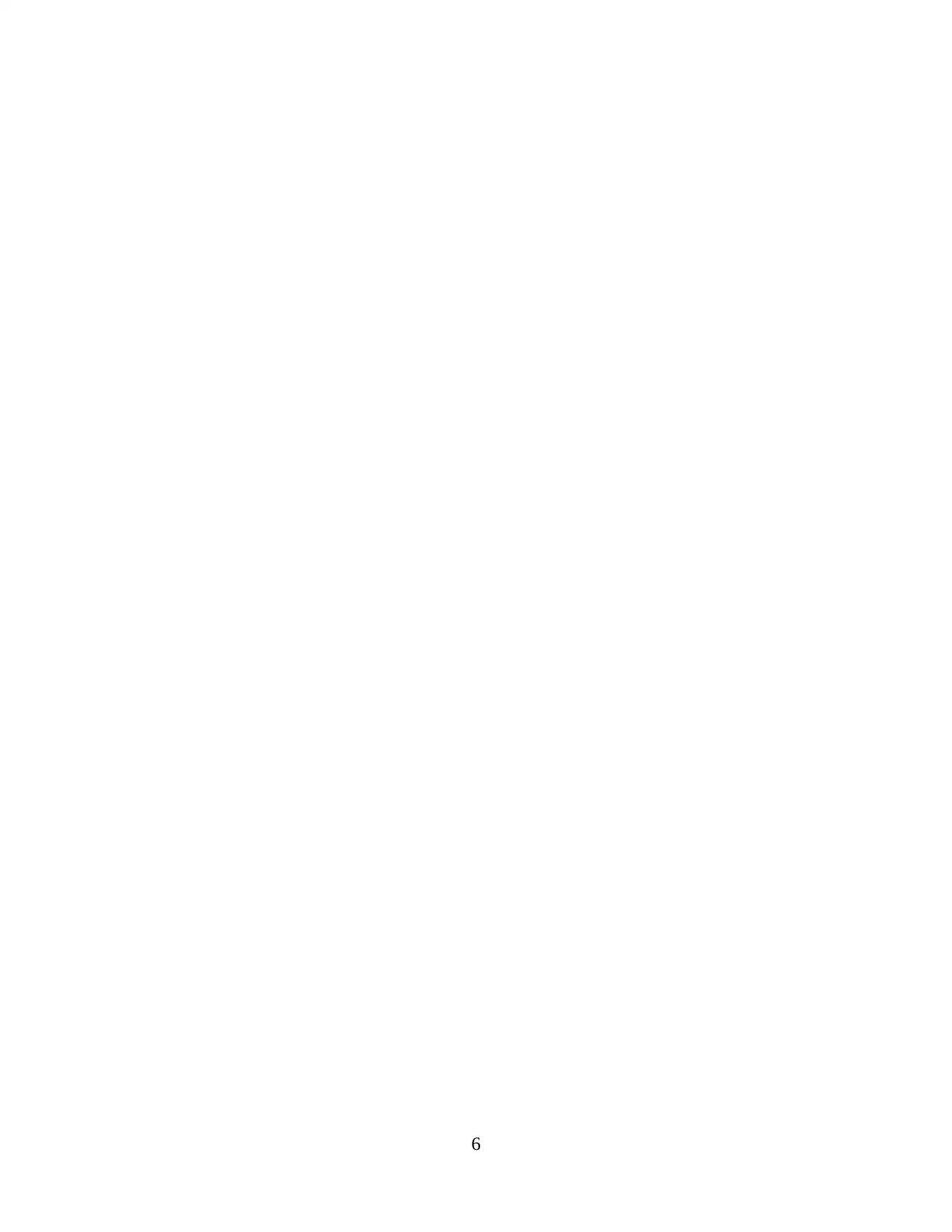
6
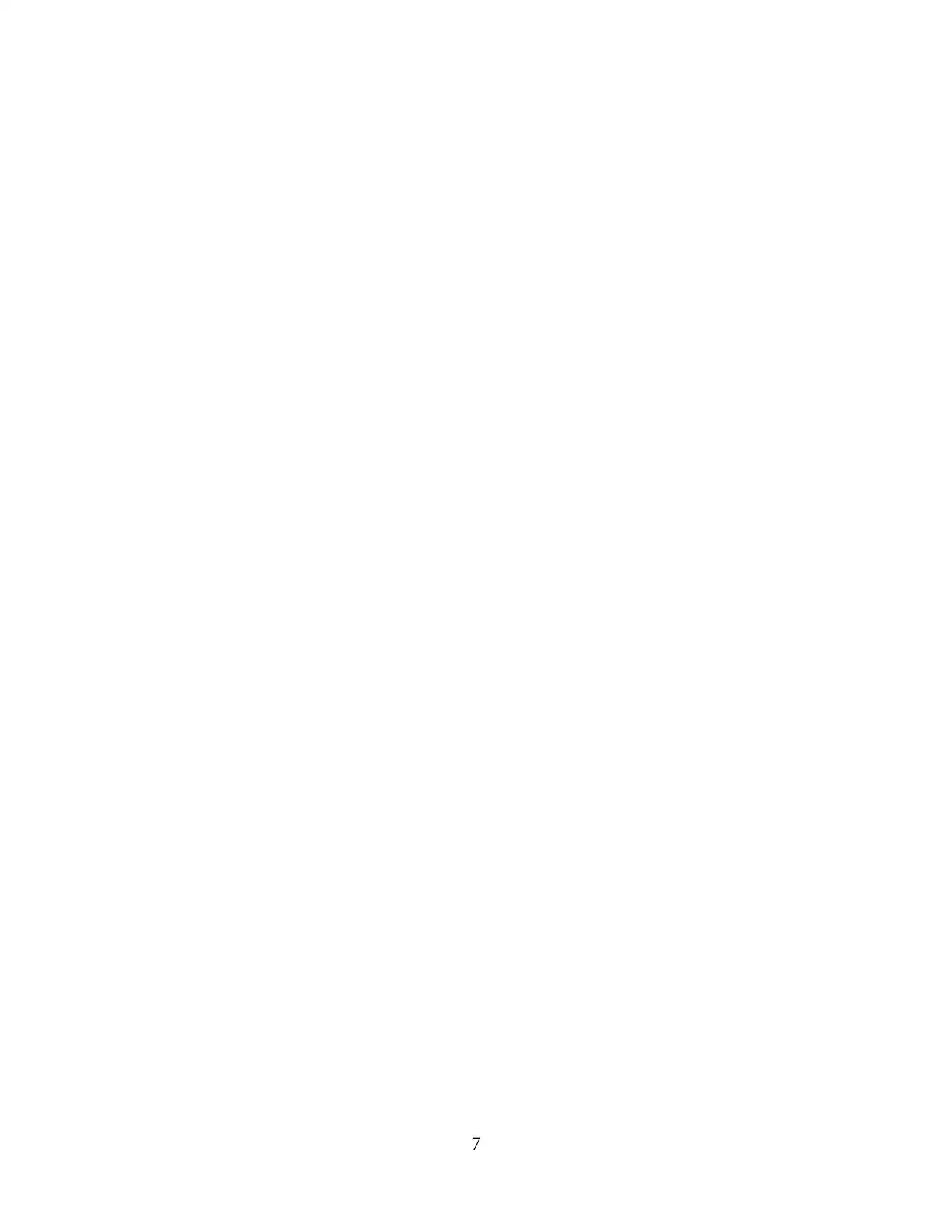
7
⊘ This is a preview!⊘
Do you want full access?
Subscribe today to unlock all pages.

Trusted by 1+ million students worldwide
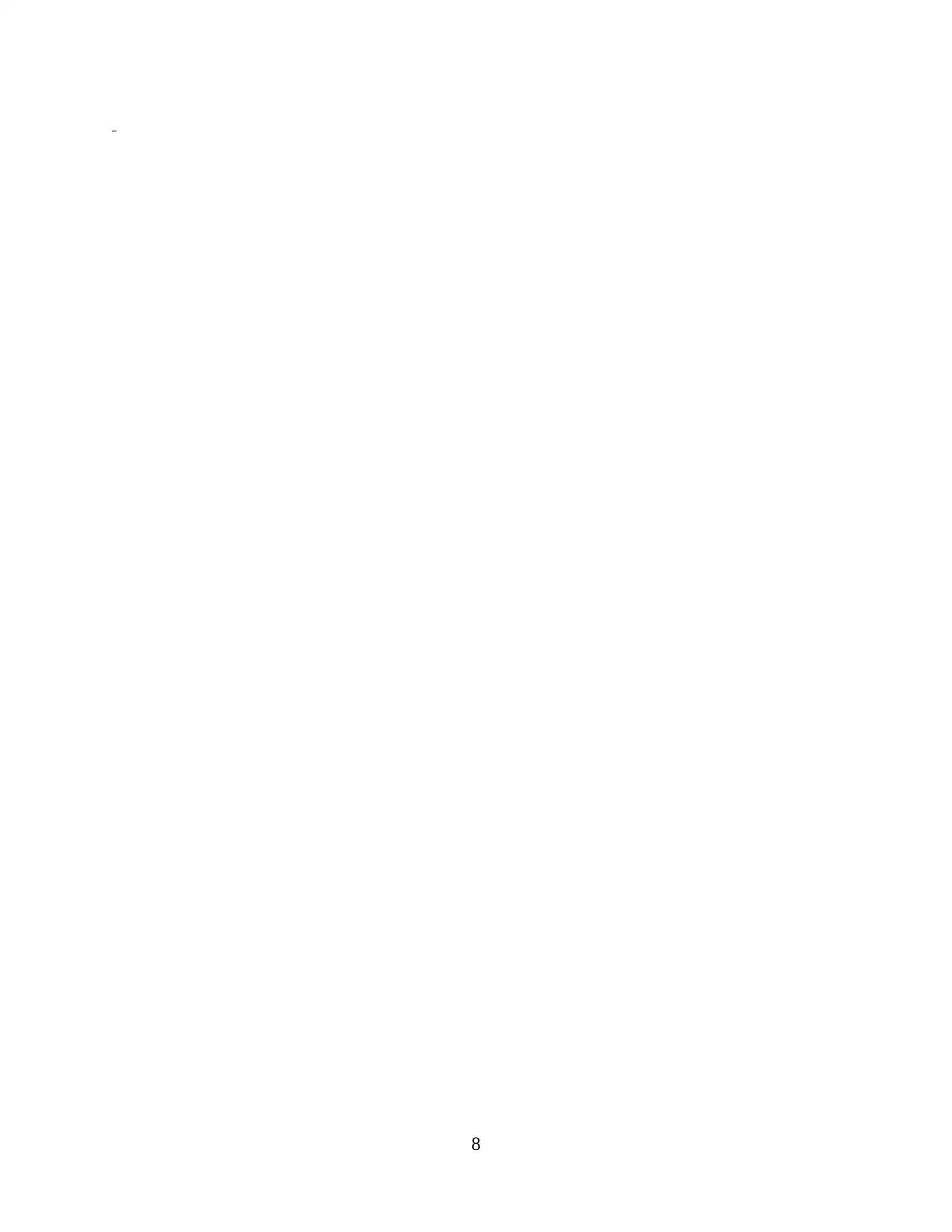
8
Paraphrase This Document
Need a fresh take? Get an instant paraphrase of this document with our AI Paraphraser
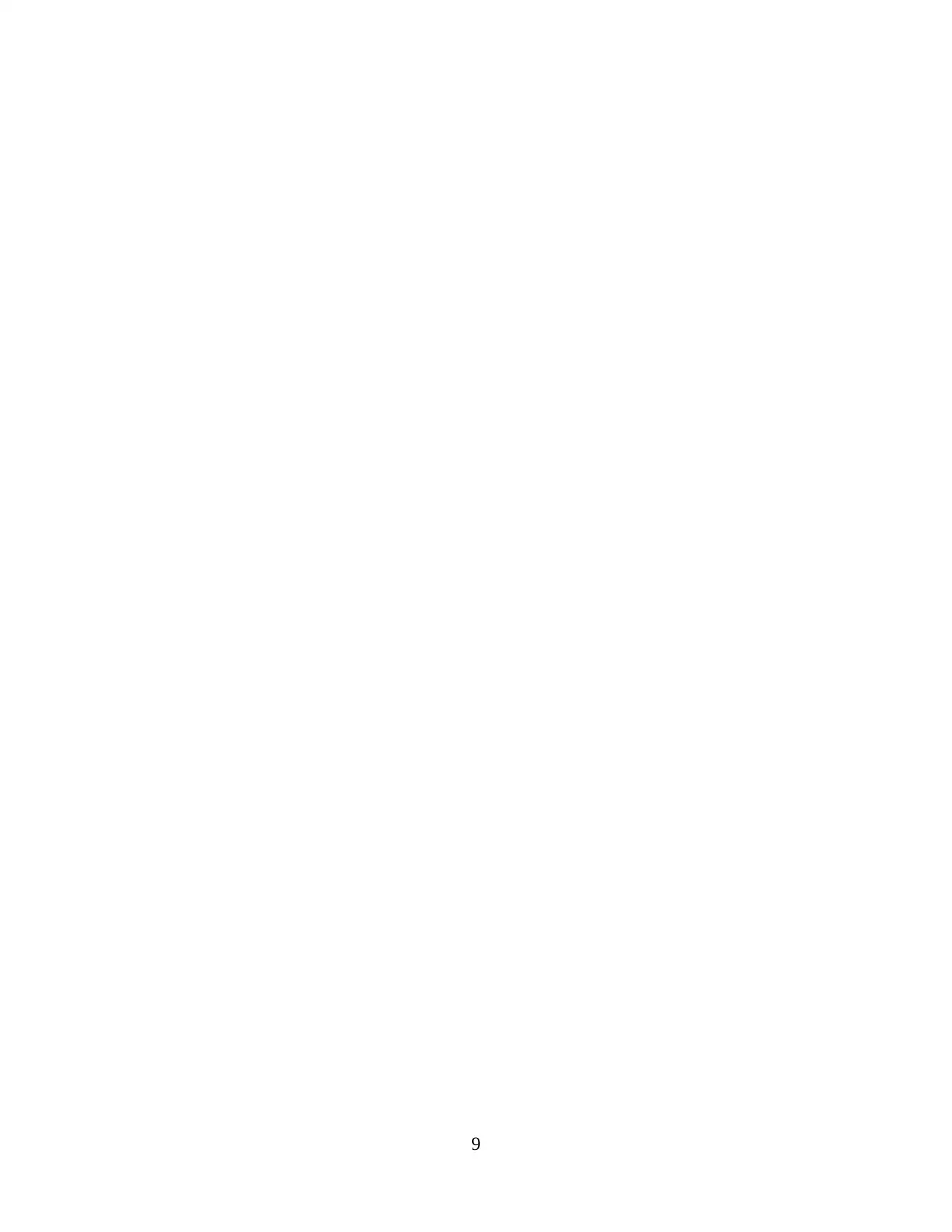
9
1 out of 11
Related Documents
Your All-in-One AI-Powered Toolkit for Academic Success.
+13062052269
info@desklib.com
Available 24*7 on WhatsApp / Email
![[object Object]](/_next/static/media/star-bottom.7253800d.svg)
Unlock your academic potential
Copyright © 2020–2026 A2Z Services. All Rights Reserved. Developed and managed by ZUCOL.


